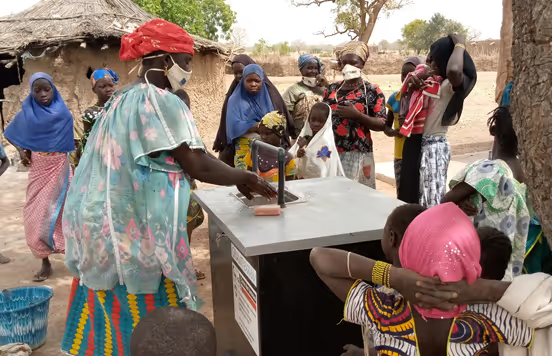Community and Primary Care Level innovations for cardiometabolic disease care in humanitarian settings

Project overview
Elrha’s new initiative, supported by the Novo Nordisk Foundation, seeks to identify and promote locally developed innovations for the prevention and management of cardio-metabolic diseases (CMDs) in humanitarian contexts. This project is part of a broader effort to strategically address the gaps highlighted in Elrha’s 2021 Humanitarian Health Evidence Review on non-communicable diseases (NCDs) in crisis settings and is strongly linked to our 2024 research priority setting on NCDs in crisis. It demonstrates the value of identifying research priorities to ensure that limited resources are allocated effectively, enabling greater impact on health outcomes through enhancing the humanitarian response.
Project solution
This project offers [specific solution or intervention] to tackle [challenge]. By implementing [strategies, tools, or innovations], the project aims to achieve [desired outcomes]. The approach is designed to [specific actions or methods] to bring about meaningful change in [community, region, or issue area].
Expected outcomes
This project aims to achieve [specific outcomes], such as [measurable results, improvements, or changes]. The expected impact includes [benefits to the target community, advancements in research or innovation, or long-term effects]. By the end of the project, we anticipate [specific changes or milestones] that will contribute to [broader goals or objectives].
The problem
Much of the existing evidence on NCD care in crises focuses on protracted emergencies where health systems have had time to adapt, such as in Syria and Ukraine. However, in contexts marked by acute healthcare disruptions, widespread food insecurity, and collapsed coping mechanisms, vulnerability to NCDs significantly increases. At the same time, humanitarian actors face growing financial and operational constraints that make delivering effective NCD care increasingly challenging.
Study purpose
The primary objective of this project is to identify, document, and promote innovations in the prevention and treatment of cardiometabolic diseases (CMD) at the community and primary care levels within crisis-affected settings. This initiative aims to compile novel approaches emerging in humanitarian contexts where healthcare services have been severely disrupted.
The geographic focus will be on humanitarian settings in Africa with a high burden of CMD, where the existing evidence base is notably limited. Innovations of interest may encompass service delivery models, social innovations, digital solutions, and other relevant interventions. Given the high morbidity and mortality associated with cardiometabolic conditions such as diabetes and hypertension, and the current gaps in integrated care approaches, this work seeks to address these critical conditions in some of the most challenging contexts.
Expected outcomes
By identifying, documenting, and promoting locally-driven, innovative interventions for the prevention and management of cardiometabolic diseases (CMD) in humanitarian crisis settings across Africa, we aim to engage a diverse range of policy makers, researchers, and practitioners. Through strengthening and expanding the evidence base, we seek to create an enriched knowledge environment that encourages investment in scaling promising solutions, ultimately contributing to improved health outcomes in crisis-affected communities.
This work will inform case studies that will be analysed using an innovation impact analysis framework. Additionally, the project includes conducting an innovation landscape analysis to assess the barriers and facilitators to scaling these innovations. Key outputs will include a comprehensive report, a donor briefing document, a series of dissemination events, and an in-person convening.
Our three phase approach
Phase 1: Inception (until July 2025)
We will establish a multidisciplinary steering committee and select a leading research partner in Sub-Saharan Africa. Together, we will define the scope, methods, and frameworks for identifying and analysing innovative solutions, culminating in a detailed inception report.
Phase 2: Innovation Identification, analysis and documentation (until December 2025)
Guided by our steering committee, we will identify promising local innovations for preventing and managing cardio-metabolic diseases through desk research and practitioner networks. We will assess these solutions through field visits, interviews, and an in-depth innovation landscape review to understand impact and scalability.
Phase 3: Stakeholder engagement and socialisation (June 2025 - March 2026)
We will share insights and amplify the most impactful innovations through multilingual case studies, reports, webinars, and a convening event in Africa. We aim to engage Ministries of Health, researchers, humanitarian actors, and global NCD networks, ensuring this work shapes policy, practice, and funding decisions. We will also represent the project at key global NCD forums, including events in the run up to and during the UN High-level Meeting on NCDs
Calling civil-society organisations, practitioners, policymakers and researchers working in this space
If you are currently working in this space or have engagement with innovations for CMD prevention and management - we would love to hear from you. Please reach out to Dr. Shivani Patel, Research Manager at Elrha at [email protected].
Project delivery & updates
Stay up to date with the latest developments from this project. Here, you will find details on what has been delivered, resources created, and regular updates as the project progresses. Access key documents, reports, and other materials to see how the project is making an impact.